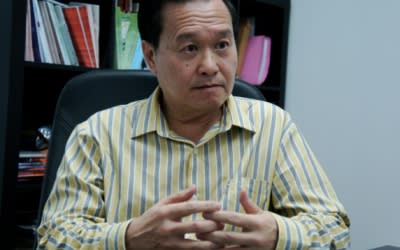- Joined
- Nov 25, 2011
- Messages
- 28,750
- Points
- 113
https://sg.news.yahoo.com/blogs/singaporescene/unfairly-criticised-tan-kin-lian-051155638.html
SingaporeScene
9 August 2011

Tan Kin Lian defends the decisions he made in his 30 years at NTUC Income. (Yahoo!)
Presidential hopeful Tan Kin Lian has said that he has been "unfairly criticised" for some business and investment decisions he made in his 30 years heading Singapore insurance cooperative NTUC income.
In one of his blog posts on Wednesday, Tan cited examples of bad investments, in particular NTUC Income's involvement in the now-defunct overseas resort chain Club Nuansa and Ciputra Mall in Jakarta.
Both ventures led NTUC Income to write off some $30 million. However, Mr Tan said this amount was "more than offset" by over $1 billion in gains from other property and equity investments.
In defence of NTUC Income operating some businesses unrelated to insurance, Tan said that these involved small sums of money and were meant to improve policyholders' lifestyles.
He said, "With the help of colleagues, we grew the assets 600 times; from $28 million in 1977 to $17 billion when I left in 2007."
In addition, he said that in running NTUC Income to benefit policyholders, he had adopted two key strategies -- he used cooperative principles and he kept operating expenses low.
Tan said that under the cooperative principles, the dividends paid to shareholders, restricted by law, averaged 6 percent a year.
He also said that in the second half of his time at NTUC Income, these cooperative principles started to diminish as more directors were taken from outside for their management and professional experience.
"Coming from the private sector, they are not likely to understand the cooperative principles so passionately," he said.
Also, in order to keep operating expenses low, Tan highlighted that NTUC Income paid insurance agents lower commission rates than the market industry and that his own salary was half that of his counterparts in the industry.
He said that he chose not to spend "large sums of money on computer systems, on expensive management consultants and large-scale advertising" even though they may have contributed to running the cooperative in a "more professional way."
His comments come in light of NTUC Income revealing last week that Tan was asked to leave because it needed to "move to the next level" and "professionalise" itself.
"The ultimate test is as follows -- will a 'more professional' approach give better return to policyholders, charge lower premiums for the insurance and provide better service to the policyholders?" Tan asked.
I was unfairly criticised: Tan Kin Lian
SingaporeScene
9 August 2011

Tan Kin Lian defends the decisions he made in his 30 years at NTUC Income. (Yahoo!)
Presidential hopeful Tan Kin Lian has said that he has been "unfairly criticised" for some business and investment decisions he made in his 30 years heading Singapore insurance cooperative NTUC income.
In one of his blog posts on Wednesday, Tan cited examples of bad investments, in particular NTUC Income's involvement in the now-defunct overseas resort chain Club Nuansa and Ciputra Mall in Jakarta.
Both ventures led NTUC Income to write off some $30 million. However, Mr Tan said this amount was "more than offset" by over $1 billion in gains from other property and equity investments.
In defence of NTUC Income operating some businesses unrelated to insurance, Tan said that these involved small sums of money and were meant to improve policyholders' lifestyles.
He said, "With the help of colleagues, we grew the assets 600 times; from $28 million in 1977 to $17 billion when I left in 2007."
In addition, he said that in running NTUC Income to benefit policyholders, he had adopted two key strategies -- he used cooperative principles and he kept operating expenses low.
Tan said that under the cooperative principles, the dividends paid to shareholders, restricted by law, averaged 6 percent a year.
He also said that in the second half of his time at NTUC Income, these cooperative principles started to diminish as more directors were taken from outside for their management and professional experience.
"Coming from the private sector, they are not likely to understand the cooperative principles so passionately," he said.
Also, in order to keep operating expenses low, Tan highlighted that NTUC Income paid insurance agents lower commission rates than the market industry and that his own salary was half that of his counterparts in the industry.
He said that he chose not to spend "large sums of money on computer systems, on expensive management consultants and large-scale advertising" even though they may have contributed to running the cooperative in a "more professional way."
His comments come in light of NTUC Income revealing last week that Tan was asked to leave because it needed to "move to the next level" and "professionalise" itself.

"The ultimate test is as follows -- will a 'more professional' approach give better return to policyholders, charge lower premiums for the insurance and provide better service to the policyholders?" Tan asked.





